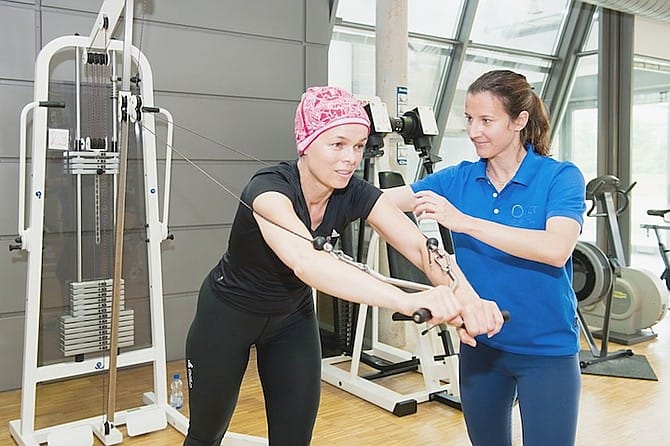Medical Fitness
Why Specialize in Cancer Exercise?
The burden of cancer in Canada continues to rise; in 2018, over 207,000 Canadians were diagnosed with cancer.
According to the Canadian Cancer Society, during their lifetime, nearly 1 in 2 Canadians will be diagnosed with cancer, that’s an astounding number! Cancer is predominately seen in those 50 years of age and older, with nearly 90% of new cancer cases being diagnosed in those over the age of 50.
The median age for Canadians now stands at 41.3 . As the age of your clients continues to increase, so does their risk for cancer, and the possibility that you will be working with someone who has cancer, or is a survivor, continues to grow. As well, cancer death rates are declining in Canada, which means there will be more survivors who will need the help of a Fitness Professional with the Specialization to work with cancer patients.
Are you prepared to work with this population?
YOU CAN make an IMPACT!
Though cancer may be one of the major causes of death, experts believe that nearly 30 to 50 percent of all types of cancers may be prevented by leading a healthy lifestyle. Survivors can reduce their risk for recurrence by:
• eating a balanced diet
• committing to regular exercise
• engaging in mindful practices to reduce stress.
As a Fitness Professional, these are areas that you can influence, which will have a greater impact in the lives of your clients.
How is working with a client who has cancer, or is a survivor, different than working with your regular clients?
Depending on where they are, either in treatment, or years into survivorship, each cancer patient has unique needs that are different from a regularly healthy client. With cancer clients, it is important to know:
• Do they have clearance from their Doctor to exercise?
• What type of cancer did(do) they have and how long ago was the diagnosis?
• What treatment(s) were given: radiation, chemo, drug therapy etc.?
• Did they have surgery, if so, how long ago, what type, and where are the incision sites?
• Did they have nodes removed? If so, where?
• Do they have (or have they had) lymphedema?
• Has their Doctor put any limitations for their exercise program, for example do they need to wear a compression garment; they shouldn’t lift more than 10lbs etc.?
• Are they still taking medication, if so which ones?
These are just some of the questions that you will want to ask as part of your intake form!
Why is this information necessary?
Let me provide an example,
A breast cancer survivor wants to train with you. She had a mastectomy of her right breast two years ago, with radiation and 11 nodes removed, and a Lat Flap (Latissimus Dorsi Flap) reconstruction completed six months ago.
One of the exercises that we frequently use with our clients is a Lat Pulldown, but would you add a Lat Pulldown to this client’s exercise program?
The answer is NO, and here is the reason. A Lat Flap reconstruction entails pulling the latissimus dorsi though the underarm area, to the chest area, and using it to create the breast mound, or it is folded to create a pocket where the implant is placed. Then a football shaped piece of skin from the back is sewn into place, on the front of the chest, with the blood vessels intact.
So, what would happen if that client did a Lat Pulldown? The left Lat would be engaged, in her back, the right Lat which is now part of the breast would be engaged in her chest. Therefore, a Lat Pulldown and certain other back exercises would not make sense as part of her program. She may also be at risk for lymphedema because of the radiation and node removal, so other precautions should be taken with this client, such as having the her perform upper body lymph drainage exercises prior to any exercise session. Our clients expect that we have the knowledge to take them safely and effectively through an exercise program but without specialized training how would you know what to do?
Given that almost 50% of Canadians will be diagnosed with cancer in their lifetime, you are probably already training clients who either have cancer or are in recovery/survivorship. Perhaps you have been touched by cancer personally and want to help a friend or family member but are afraid of hurting them. Even if you have years of training experience in the fitness field, you may not feel prepared to work with this population, and without more advanced qualifications, you probably are unaware of the issues that survivors may face that are different than the general population.
The Cancer Exercise Specialist® Advanced Qualification and/or Breast Cancer Recovery BOSU® Specialist™ will improve your skill in designing and implementing safe and effective programs to help patients/clients minimize treatment side-effects, correct range of motion and muscle imbalances, minimize pain, increase energy, improve self-confidence and so much more.
Learn more about being a Cancer Exercise Specialist® Advanced Qualification and/or Breast Cancer Recovery BOSU® Specialist™ at www.medexn.com and take the next steps to advance your career and help more clients change their lives, as you become part of the growing Medical Fitness Exercise Community in Canada!



This is a wonderful section to leave Insights